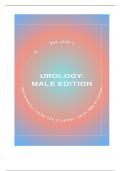Summary
Urology Summary
- Course
- Institution
In this summary, I cover important notes, especially from the clinical book about urology (male system). This summary helped me get a 9 on the urology exam for medicine. Hope this helps you just as much! Words are mainly in English, but possibly also partly in Dutch.
[Show more]



